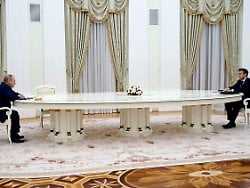Five-hour talk in the Kremlin
Macron has an open ear for Putin
2/7/2022, 9:10 p.m
Russian President Putin still feels that his French colleague Macron understands him best in the conflict with the West. The two have been working on a solution to the Ukraine crisis for a long time. But their meeting in the Kremlin is about much more.
French President Emmanuel Macron tormented him for about six hours in view of the tensions in Ukraine. This is how Kremlin chief Vladimir Putin summarized his first personal meeting with Macron in more than two years. And in the end, it was already after midnight in Moscow, both of them – after a multi-course dinner – seemed visibly relaxed, while the USA continued to warn of a war in Ukraine.
Macron made it clear that he had received many answers to his questions from Putin, which he now wants to carry on – this Tuesday first to Kiev for a meeting with Ukrainian President Volodymyr Zelenskyy. He then meets Chancellor Olaf Scholz in Berlin after his return from the USA. The next few days will be crucial for security in Europe, said Macron.
Putin praised that his guest brought some suggestions that Russia would support. But before the public finds out about it, Macron first wants to talk to Zelenskyy and his western partners, and then he wants to call Putin again. The 69-year-old has valued the 44-year-old Macron for five years not only as a mediator – alongside Germany – in the Ukraine conflict. The Kremlin boss always has an open ear when it comes to Russia’s interests in Europe. “There is no security for the Europeans if there is no security for Russia,” said Macron, who had previously had three crisis phone calls with Putin to ease tensions in Europe. Nobody had expected a breakthrough from this meeting.
Putin is pushing for the implementation of the Minsk peace plan
Macron also criticized that Russia has stationed 125,000 soldiers on the border with Ukraine. This means that Russia’s neighbors feel threatened. Putin, in turn, complained that there were an equal number of soldiers on the Ukrainian side. The country has tried twice to take back the breakaway areas in the Donbass by force. And he called on Macron to urge Ukraine to fulfill its obligations under the Minsk peace plan during his visit to Kiev.
Putin made it clear that he was counting heavily on Macron, whom he uses in the struggle for peace in Europe. Macron had made it clear even before his arrival in snowy Moscow that, from his point of view, Russia is not only concerned with Ukraine, but “to clarify the rules of cooperation with NATO and the EU”. As previously at a meeting with Hungarian Prime Minister Viktor Orban, Putin complained that NATO, the USA and the West do not take Russia’s concerns about their own security seriously. And he made it clear that NATO and US weapons on Russia’s borders are a danger. And once again he emphasized that Moscow would not accept Ukraine’s admission to NATO without resistance, because then there would be a risk of war over the Black Sea peninsula of Crimea.
Seen in this way, the deployment of Russian troops along the border with Ukraine is primarily seen as muscle flexing, with which Moscow is emphasizing its demands for security guarantees. The Kremlin has been denying allegations by the United States that it is actually preparing for an attack on Ukraine for weeks. Russian state media commented that the US was frightening the whole world with its hysterical warnings of war. A visit by Macron to Putin could do a lot to ease the tension, it said.
Before Macron’s trip, the Élysée Palace had emphasized the close coordination with the EU partners, above all with Chancellor Olaf Scholz. Macron phoned US President Joe Biden, NATO Secretary General Jens Stoltenberg and several times with Ukrainian President Selenskyj. It is about a uniform, coordinated announcement to Moscow with clearly defined consequences in the event of aggression, it said in Paris.
Political scientist: Putin has already achieved a lot
Macron’s intensive mediation in the crisis coincides with the start of the hot phase of the presidential election campaign in France, and he has not yet declared his expected candidacy for a second term. But the visit to Moscow as a crisis manager shouldn’t hurt. The President said that a lot had already been achieved through the dialogue in the past few days so that the situation would not escalate any further.
Putin was ready to talk. It is true that he turned down the key points of his much-noticed list of demands for more security in Europe from the USA and NATO. However, the Russian political scientist Dmitri Trenin said in a round of talks at the Moscow think tank Carnegie Center that Putin had achieved a lot with this diplomatic “shock therapy”. Above all, there is now again a dialogue between Russia, NATO, the USA and the EU.
According to Trenin, no one in Moscow seriously believed that NATO would withdraw from Eastern Europe and to its 1997 positions, as Putin had demanded. The fact that Russia’s concerns are now being addressed in the West is an important diplomatic success. Trenin is convinced that the United States will not risk war over Ukraine – and that NATO will not take the country in either. Carnegie expert Andrei Kolesnikov said that Russia’s fear-mongering is primarily aimed at gaining respect. But Putin cannot gain anything by shedding blood; there is no mobilizing effect in society. Rather, the invoked danger of war and the threat of sanctions from the West alone exacerbated the economic problems in Russia. “The rating can no longer be improved with war.”
